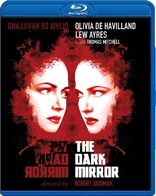The Dark Mirror Blu-ray Movie
HomeThe Dark Mirror Blu-ray Movie 
Olive Films | 1946 | 85 min | Not rated | Sep 12, 2012Movie rating
7.1 | / 10 |
Blu-ray rating
| Users | 4.0 | |
| Reviewer | 3.5 | |
| Overall | 3.5 |
Overview
The Dark Mirror (1946)
A woman suspected of murdering her doctor boyfriend has an identical twin sister. When both twins have an alibi for the night of the murder, a psychiatrist is called in to assist a detective in solving the case. Through a series of tests, he discovers which twin actually committed the crime and in the course of his investigation he falls in love with the normal twin.
Starring: Olivia de Havilland, Lew Ayres, Thomas Mitchell (I), Richard Long, Charles Evans (IV)Director: Robert Siodmak
| Drama | Uncertain |
| Film-Noir | Uncertain |
Specifications
Video
Video codec: MPEG-4 AVC
Video resolution: 1080p
Aspect ratio: 1.33:1
Original aspect ratio: 1.37:1
Audio
English: DTS-HD Master Audio Mono
Subtitles
None
Discs
25GB Blu-ray Disc
Single disc (1 BD)
Playback
Region free
Review
Rating summary
| Movie | 3.5 | |
| Video | 4.0 | |
| Audio | 3.5 | |
| Extras | 0.0 | |
| Overall | 3.5 |
The Dark Mirror Blu-ray Movie Review
Two heads are crazier than one.
Reviewed by Jeffrey Kauffman August 23, 2012The April 15, 1942 edition of The Film Daily, once one of Hollywood’s leading industry papers, contains one of the most remarkable full page “ads” ever placed in a movie related publication. It read:
-
An Open Letter to Lew Ayres
The newspapers this week have carried a story from Miami which has distressed me deeply because things I said have been misquoted. These are the facts:
During an informal dinner in my home at Miami Beach where I spent a few days, you were being discussed and severely criticized. I felt that my guests should know you as I do. It was not my province to judge your philosophy or the road you have taken. I said: “Since Lew Ayres is not with us, since this boy is away at camp, I can speak as an individual and not as the head of a company in which he is a star.”
I told my guests that you were one of the finest men it has ever been my privilege to know, a person of utter sincerity. I explained to them that you had asked your country to send you to the front lines as an ambulance driver no matter how great the risk, that it was your hope to save human lives, that you could not kill. In this connection I told them a fat with which they were not familiar, that you did not eat fish or meat or anything that had to be killed. I told them ath in hall Hollywood there was no more charitable individual, that there was no cause for which you did not give bountifully. I pointed out specifically the splendid work you have been doing for the Red Cross. I told them that you not only made large contributions of money but that day and night, apart from your studio duties, you had devoted yourself to conducting classes in first aid.
Among those present was a Miami newspaperman. He expressed great interest in many of these statements, was delighted to get a true picture of an individual who had been misunderstood. Mind you, at no time did I discuss or express agreement with the stand you have taken. Frankly, I must confess that I have never understood your position. It is a peculiarity beyond my personal comprehension.
What you saw in the papers was a distressing misrepresentation, doubtless unintentional. I wanted you to know.
—Nicholas M. Schenck
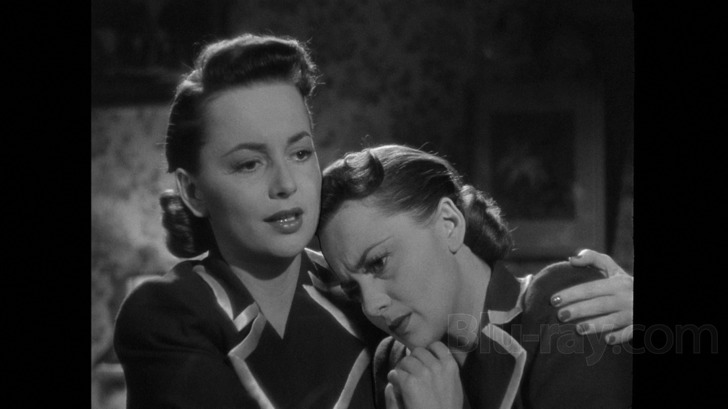
The forties were rife with films featuring kindly psychoanalysts helping troubled patients find balance. Hitchcock’s Spellbound and another film starring de Havilland, The Snake Pit, posited the “wonders” of the modern mental health system. Sure, there were problems, like the nefarious asylum employee in Spellbound and an underhanded nurse in The Snake Pit, but the general thesis here was that mental illness could be cured. It might just be my decades’ long fascination with Frances Farmer, but I’ve long felt it was no mere coincidence that American film started celebrating the supposed success of psychoanalysis shortly after Farmer’s notorious problems and, somewhat ironically, her brief 1944 release from a Washington state institution where she had been pronounced “completely cured” due to the "modern miracle" of psychoanalysis. (Another irony is that Farmer’s ex- husband Leif Erickson co-starred with de Havilland in The Snake Pit, a casting choice that seems to have hardly happened purely by chance.)
Ayres’ Dr. Elliott is, like the Ingrid Bergman character in Spellbound, romantically interested in the ostensible patient of The Dark Mirror, though the film of course has the twist that there are actually two patients, identical twins Terry and Ruth Collins, both played by de Havilland. When blustery policeman Lt. Stevenson (Thomas Mitchell) enlists Elliott’s aid in ferreting out which of the sisters may have committed a vicious murder, Elliott puts the entire gamut of psychoanalytical tools to work in trying to dig down into the sisters’ somewhat twisted relationship.
The Dark Mirror is not an entirely successful film, partly because it never really exploits the noir ambience it rather fitfully flirts with at several moments. Perhaps due to Mitchell’s comic take on the policeman’s character, the film has a weird tonal imbalance that veers from the melodrama of the Collins sisters to the romance involving Elliott to bizarre little “bits” for Mitchell, some of them rather incredibly supported by whimsical cues from composer Dimitri Tiomkin (listen to what happens on the soundtrack when Lt. Stevenson talks about being confused by “Chinese music”).
The other major stumbling point in the film is how it completely tosses away one of the most intriguing aspects of its very conceit: the fact that people haven’t been able to tell Terry and Ruth apart. Instead the film relies on an almost funny gambit of having the sisters wear little necklaces with their names on them, no doubt a shortcut for late forties audiences perhaps not so used to films with one good and one bad twin. The Dark Mirror would have been a much more effective piece had it plied the ambiguity at the core of its story with more nuance, instead of making things so crystal clear.
The film is nonetheless quite effective at times, mostly due to some stellar special effects (look at screencap 1 for a startling little piece of matte work that is far more impressive in motion than it appears here) as well as de Havilland’s commanding performance(s) as the Collins sisters. De Havilland was able to rather convincingly play a disparate set of characteristics, from mousy timidity (rather similar to her sister Joan Fontaine’s performance in Rebecca) to overweening arrogance (rather like Judith Anderson’s Mrs. Danvers in the same Hitchcock film). De Havilland is the best reason to watch The Dark Mirror, a film that probably doesn’t quite achieve the noir heights that some of director Robert Siodmak’s other films in the idiom do. The film plays more like a standard potboiler now, with so many “good and evil twin” films which have come in The Dark Mirror’s wake, but even within the often standard melodrama approach, upon reflection (sorry) there are some nice little touches along the way here.
The Dark Mirror Blu-ray Movie, Video Quality 
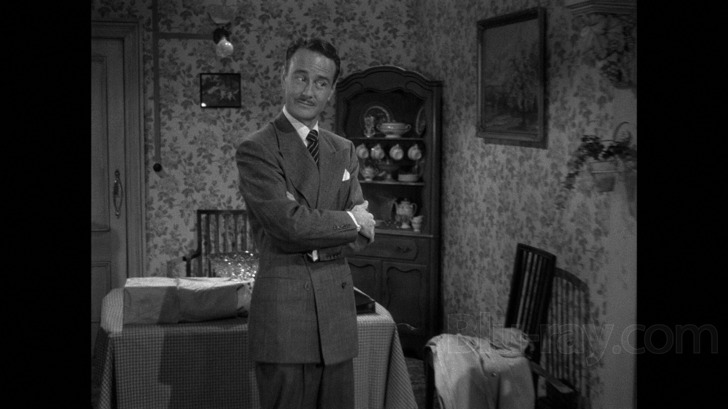
The Dark Mirror is presented on Blu-ray courtesy of Olive Films with an AVC encoded 1080p transfer in 1.33:1. This is for the most part a very sharp, balanced and appealing looking high definition presentation. The elements are generally in very good shape, though the typical age related flecks and specks, as well as some very minor and transitory scratches, show up along the way. Contrast is quite strong throughout this presentation and blacks are solid and deep. There are one or two shots that seem to have been sourced from different elements than the bulk of the film—one insert of de Havilland as Terry toward the end of the film almost looks like it came from 16mm, but this transfer presents the film in a well detailed and nicely clear manner that should please most fans of classic black and white films.
The Dark Mirror Blu-ray Movie, Audio Quality 
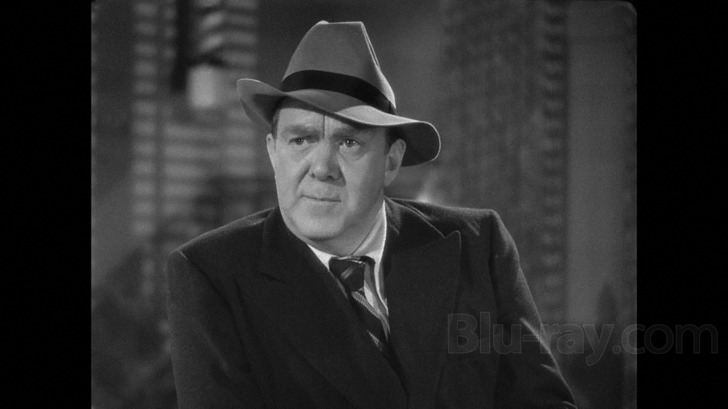
The Dark Mirror's lossless DTS-HD Master Audio Mono track doesn't offer a lot of "wow" factor, but it certainly presents the modest sound design of the original film with a fair degree of clarity and fidelity. Tiomkin's score, despite its occasional flights into whimsy, sounds nicely full bodied, especially in the midrange. Dialogue is cleanly and clearly presented, though de Havilland's post-looped "inserts" as whichever twin isn't on screen sport noticeably different ambient characteristics.
The Dark Mirror Blu-ray Movie, Special Features and Extras 
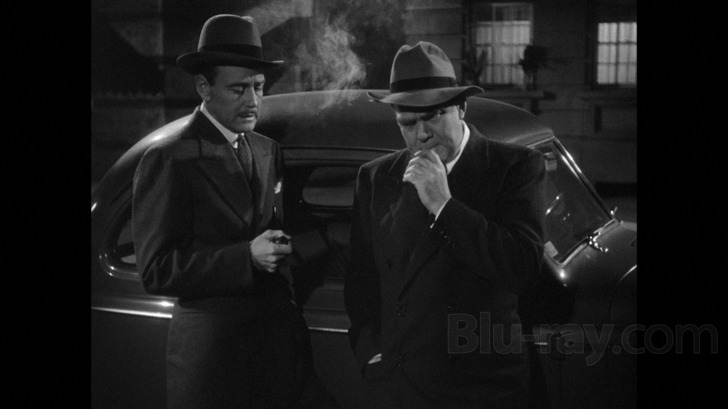
No supplements of any kind are offered on this Blu-ray.
The Dark Mirror Blu-ray Movie, Overall Score and Recommendation 
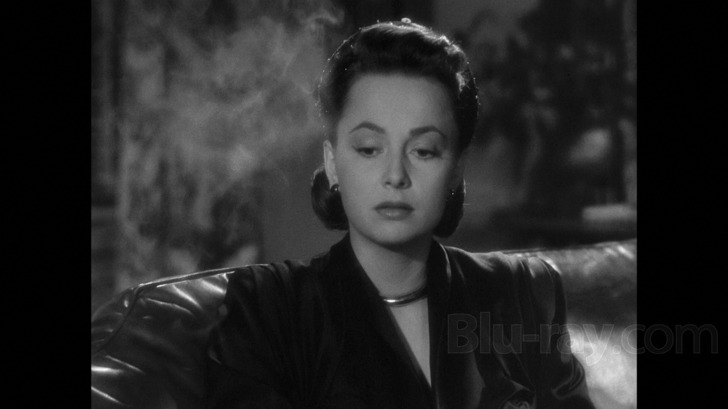
The Dark Mirror is a little too pat for its own good, something that probably wasn't as much of an issue back when the film premiered as it is today, when audiences have seen any number of these "good twin, bad twin" escapades. Still, even with its rote aspects, The Dark Mirror presents a chance for de Havilland to really strut her stuff, and she does so quite magnificently. Mitchell's comic take on the policeman is fun, if not exactly in tune with the general tenor of the film, and Ayres is understated and sympathetic as the kindly psychoanalyst out to help the Collins sisters, albeit in different ways. De Havilland is the most commanding reason to enjoy this film, though, and along with this Blu-ray's nice looking video and good audio, she makes this release Recommended.
Similar titles
Similar titles you might also like

Secret Beyond the Door
4K Restoration
1947

The Big Combo
1955

Force of Evil
4K Restoration
1948

The Killers
1946

The Naked City
1948

Scarlet Street 4K
1945

Leave Her to Heaven
1945

Out of the Past
Warner Archive Collection
1947

Phantom Lady
1944

Whirlpool
Limited Edition to 3000
1950

Bullhead
Rundskop
2011

Witness to Murder
1954

On Dangerous Ground
Warner Archive Collection
1951

The Boston Strangler
Limited Edition to 3000
1968

La Bête Humaine
1938

The Glass Key
1942

Double Indemnity 4K
1944

No Orchids for Miss Blandish
1948

The Big Heat 4K
1953

Possessed
Warner Archive Collection
1947
